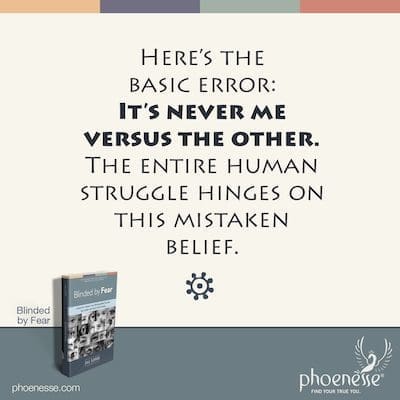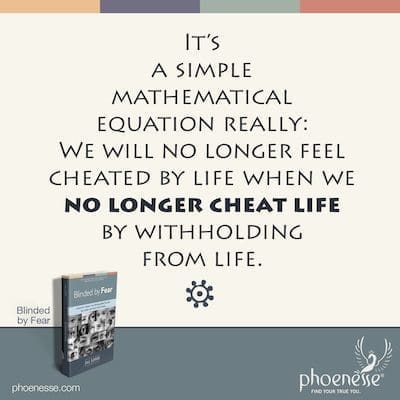Our biggest struggle in life is the push and pull we face between our desire to overcome our loneliness and isolation, and our simultaneous fear of having close, intimate contact with another person. Often these are equally strong, tearing us apart from the inside and creating a tremendous strain.
The pain of feeling isolated always pushes us to try to escape from it by becoming more close with someone. Should such attempts appear to be getting somewhere, our fear of closeness will erupt and cause us to pull back again, and push the other away. And so the cycle goes with people, first erecting uncrossable barriers between ourselves and others, and then knocking them back down.

If we’re walking on a spiritual path of self-realization, sooner or later we’ll see the predicament we’re in. For every disharmony, disturbance and shred of suffering we uncover has the same simple common denominator: our struggle between desiring and fearing closeness. And it’s our insistence to holding onto both of these feelings that creates the barriers that keep us in separation.
Our relationships with other people will only go well when we are motivated by our innermost selves. For our intellect and will alone can’t navigate the delicate balance of allowing our own self-expression while also receiving the self-expression of others. There isn’t any rule that can be made to manage the rhythm of mutual exchange. And our outer brains are out of their league here.
The ego-mind is also not equipped to negotiate the fine balance needed between asserting ourselves and allowing another to assert themselves, between giving and receiving, between being active and being passive. And there are no pat formulas we can lean on. This doesn’t mean our outer intellect has no value. It’s an instrument that thinks mechanically, makes decisions, and determines rules and laws. But by itself, it doesn’t have the intuitive sense or flexibility needed to meet each moment as it comes. It doesn’t have the capacity to respond adequately. For that, we need to tap into the core of our being and activate our inner command center that’s dynamically responsive. Then and only then can our relationship with someone else be spontaneous and satisfying for both of us.
If we’re not in contact with our core, we won’t be able to function right when life calls for a creative solution. We also won’t be able to reach the inner center of another person. And this is precisely what needs to happen if we want to move out of isolation. For this is what real closeness and real relating are like, where intimate self-expressions flow with the stream of life and carry us to a place of vibrant peace. Anything short of that feels like effort, strain and difficult discipline, and none of these can ring the bell of reaching the joy of intimacy.
As we may have already figured out, people are terrified of themselves. We’ll do everything we can to avoid having to look at ourselves. And yet, when we manage to move past some specific difficulty and resistance, we come to find that our fears weren’t justified; we feel relieved and have a renewed sense of aliveness. Just then, at that moment, we’ve contacted our innermost self. But if we continue to evade ourselves—and our evasions can take many forms—it will be impossible to enjoy real contact with others.
Why do we have so much fear about contacting our own core or the core of someone else? It stems from our deep-seated refusal to give ourselves over to life. Believe it or not, this is our aim, to hold ourselves back, which is entirely destructive. Truth is, if we were willing to give our best to life, we’d never be in conflict. But instead we all sit on a pile of inner riches and won’t offer them to life. Often, we’re not completely sure what our assets are. Although even if we do sense them, it doesn’t occur to us to offer them up.
However, once we open the tap of our inner wealth, something must start to happen. A great inner machine will spring to life that we have no reason to fear. An inner movement will begin to take place that operates in beautiful order and harmony. Each of us can move from being an isolated creature who keeps their assets to themselves, sometimes letting them lie abandoned and unused, to becoming someone who gives their best to life. The change such a shift can create will be so drastic, it’s hard to convey it in words.
What before was bleak and laborious, filled with fear and strain and loneliness, will become easy and safe, relaxed and bright, and delightfully self-perpetuating. Things will fall into place automatically. We’ll come to know a deep feeling of oneness with the world.
But until such a shift takes place, we’ll feel perpetually caught in a whirlpool of wanting and fearing the same thing. And this, friends, is what torture feels like.
Two necessary approaches
This struggle of wanting and fearing closeness—both with others and with ourselves—can’t be settled by deciding with our minds to give up one of the two alternatives: closeness or separateness. It doesn’t work that way. The only way out is to surrender our destructive aims. Then the best of who we are will come tumbling forth. And then we will see that the only thing we have to fear is our own destructiveness. Give up this destructiveness and find the key to life.
It will help if we can devote a few minutes a day to thoughts like this:
“Whatever I am already, I want to give to life. I want to make the best use of who I am and what I have to give. Of course, I do not know yet what this even means, and what I do know may not be quite right. But I am open to allowing greater wisdom to arise from deep within me and to guide me.
I will leave it to life to decide what a fruitful exchange would look like. For whatever I give to life, came from life. I want to return my gifts to the great cosmic pool so they can be shared with others and bring benefits to them. I know that this, in turn, will also enrich my own life, to the same measure I am willing to give. For truly, life and I are one.
When I hold back from life, I withhold also from myself. When I hold back from others, I also withhold from myself. Whatever I am, whatever is in me, let it flow into life. Whatever more is still waiting to be discovered, I desire to put that also to constructive use. I want to enrich the world around me.”
With this approach of deliberately pursuing thoughts like this, and deeply meaning them, our problems will disappear like fog in the sun. Pain will go away and solutions will appear, even to problems that previously seemed unsolvable. This is a promise.
If, on the other hand, we feel a tight inner no-current when we speak words like these, then we now know what’s causing the pain we feel in our isolation and in our relating to others. And note, these two things operate as a team. To whatever degree we suffer from isolation, to that same degree we’ll have problems in our relationships. Further, to the extent we resist pulling ourselves out of isolation, to that extent isolation will feel painful.
It’s hard to visualize the potentials hidden inside when we are locked in painful seclusion. The key lies in following our desire to offer what we have to give. This is what releases the lock. So before we’ve even fully experienced the powers within, we can deliberately call on them. Just knowing they exist will activate them and allow us to use them constructively.
Our second approach will be to meet every situation with total honesty. It’s not enough to look at situations superficially. For when we only pay shallow attention to ourselves, we’re likely to overemphasize our secondary positive goals and overlook our more powerful destructive aims. We must pay attention to every aspect we notice so we can discover what our real attitude is.
For if everything’s not going great for us, not everything in us is constructive. Where could we be more sincere? More fair? This will bring our outsides into alignment with our insides, allowing us to cultivate a deeper connection with the divine powers that are lying dormant.
We need both of these approaches if we hope to move the meter, for both have great value. Some might be tempted to only work on activating their hidden powers. Others might concentrate on meeting themselves fully so as to eliminate their destructiveness. To pursue only one approach is a half-measure that will lead to limited results.
It’s really easy to overlook what’s going on in there. We need to see our negativity, yes, but we also need to improve our awareness of our positive potentials. Lack of awareness leads to limited chance for success. But if we do both together, while also upping our desire to contribute to life in whatever way we can, we’ll see a tremendous power come to life. By activating our inner being, peace, safety and wonderful aliveness are sure to follow.

Our basic error
We are under the mistaken impression that if we add to life, we’ll deprive ourselves. This, as one can readily imagine, creates a barrier to wanting to give to life. Conversely, we are of the wrong belief that only by grabbing for what we want—being solely concerned with attaining our own little advantage—can we nourish ourselves. This, we think, is the way to do justice to our desires and pleasure.
Such ingrained ideas motivate us to behave the way we do. And then here comes trouble. And frustration. Because the falseness behind these convictions makes us act, think and feel in ways that are damaging to everyone, including ourselves. Since we’re not aware of how powerful such a wrong conviction can be—heck, we’re often not even aware it’s a wrong conviction—we don’t understand why our efforts aren’t leading us to rewards. We become increasingly confused, setting off painful chain reactions whose nature we can’t comprehend.
Here’s the basic error: It’s never me versus the other. Nothing could be further from the truth. It will be helpful if we can meditate on all the places this error shows up in our lives. Once we see how much this belief is playing out on the level of our ego, our goal is to try to comprehend, from another level of our being, how the opposite is true. For that’s the truthful view.
Confront this mistaken concept of the ego with the deeper knowing that only by desiring to give to life—to add something to creation—can we experience pleasure. There is no pleasure we can think of that needs to be denied us. This will set the gears of our psyche going in a positive direction. We’ll start moving in a constructive direction such that even the highest pleasure can and will manifest for us. We will activate our own selves, but not as a selfish move. We’ll replace the incorrect “me versus the other” attitude, which leads to isolation, with “me and the other.”
When our psyche becomes geared toward “me and the other,” the apparent conflict between giving and receiving will disappear. We will no longer refuse to give to life. Deep sorrow and suffering, then, will also cease. Guilt and frustration will be no more. The terrible see-saw in which we suffer from isolation, reach out, succeed and then push people away, will end. Our struggle will be over.
On and on we’ve been doing this: We eliminate barriers because the pain of isolation has become unbearable, only to set up new barriers because we’re overwhelmed by our fear of closeness. Where does this fear of closeness even come from? It comes from that wrong conviction that we have to save ourselves from being annihilated. But we only hold this perspective of life’s malignant nature to whatever extent our own deepest aims are malignant.
Our work is to break down this vicious circle that pits us against life’s malignancy, as though we need to do battle with life. And this can only be broken down by wanting to contribute generously to life. Then, and only then, will we find that life is safe. It’s benign. Just like our innermost self. No more so and no less so.
Letting go
As long as our psyche is geared to go in a negative direction, we’ll fear intimate contact. Being in a relationship, then, will seem frightening. For who’s it going to be: Me or the other? Who will win? And if it feels frightening to pursue our destructive aims—which it will—everything becomes dangerous. It’s dangerous to explore ourselves, it’s dangerous to make contact with someone, and it’s especially dangerous to give ourselves up to the bliss of union.
That we must desperately avoid because it threatens to cost us our control. And without our control, our destructive tendencies could take over and threaten annihilation. So giving up control looks a lot like death. We’ll be giving up our safety if we give up our self-will. This is what really goes on as long as we hang on to our destructive aims by offering them a safe haven in our psyche.
This is why it seems to the immature psyche that the only smart thing to do is to build barriers around the self. Only this will keep the self intact. The built-in tragedy here is that as long as we allow our destructive goals to go unchecked, isolation will be what gives us a sense of identity. It will seem like the best option for preserving our individuality.
But in fact, the only way that loss of control leads to death or loss of self-power is in this negative context. Ultimately, the endgame of this conflict is mental disturbance.
When we switch from believing in a “me versus other” world to “me and the other,” and correspondingly desire to give who we are and what we have to life, we won’t fear loss of control. Because letting go of ego control will actually lead to having more control, and in a healthier, fuller sense. A constructive psyche can be trusted to be spontaneous and free. It can give itself up to inner powers that get along very nicely with life. So we can flow with life and enjoy the unity of all that is.
When we ask the little ego to give up control, we get something even better in return. For we will be activating the constructive powers that live deep at the core of our soul. And those powers make us forever more capable of determining our own fate in the best possible way. We only need that tight inner gripping when our psyche is riddled with negativity. But such holding on prevents union and free self-expression. For joyful living can only happen in a relaxed state. See the problem?
Hoping to avoid a disaster, many people hold on with ever tightening control. The big danger is that we will eventually exhaust our psyche until it lets go in a long process of extended self-alienation. So now we can start to understand the paradox that giving up control will actually lead us to better control, whereas tightly holding on to control will eventually bring loss of control.
It’s like this with all great spiritual truths: on the surface of things they seem contradictory. If we want to perceive the unity of these contradictions, we’ll have to use our deep inner listening, and not just the outer ears linked directly to our brains. For our intellect can only take us so far. If we want to verify such statements, we’ll have to live their truth. And this can only be done by following the steps of our spiritual path.
The threshold we must cross to move from self-alienation to harmony may seem daunting. But in truth, we make it harder than it needs to be. We stand there, wanting to leave our place of isolation and greed, where we demand the most from everyone else. But we fear people aren’t going to comply with us and, in turn, are going to demand from us what seems dangerous to give. If we stay stuck, waffling in this doorway, we will indeed feel deeply troubled.
What’s the way to the other side? We have to think deeply about this situation and these words, using more than our mental minds. We must consider the truth of “me and the other,” and realize it’s not true that we’re safer if we keep pursuing negative aims, hoping to defeat everyone and their brother and sister. For that’s not the road to glory. We must reach the point where our negative aims are staring us straight in the face.
It’s only then that we will see how futile our struggle has been. It will become obvious that our approach hasn’t been working and never will. We don’t have to keep using our separating mechanisms, because what we are is good, and we don’t need barriers and masks. We can begin to offer up our goodness and this new knowledge that it’s safer to be wholly who we are will come.
The entire human struggle hinges on this mistaken belief in “me versus the other.” When we start to digest this truth, this simple truth will set us free. We can make the first step toward liberty by meditating on these words:
“I am ready to give up this wrong notion that it’s ‘me versus the other.’ There really isn’t a conflict, so I can give all of myself to life. I ask for help from deep inside, and decide to give my best, without fear. Any fear I am harboring is in error. I decide to rid myself of this error and open myself instead to the divine powers that are waiting to guide me.
“I want to see the truth that ‘I am one with others,’ which means there’s no conflict between us. This is my wish, to surrender and to allow higher forces to lead me to harmony, in rightness, without effort or strain.”
If we meditate like this, we’ll increase the light within. Our difficulties will disappear in exact proportion to our embracing of this attitude. We must feel and live this key to life, and then everything else will come. But superficial words won’t turn things around.

The common denominator
Try applying this beautiful formula to a specific problem you are facing. For if we look closely, we’ll see that every problem can be brought down to a simple common denominator: We fear giving of ourselves, and instead are feeding a destructive attitude. This is why we have the problem. The trouble is, our withholding and our belief in “me versus the other” set off negative chain reactions, and they really are damaging to us. This makes it look like our wrong conclusion that “it’s me versus the other” was right. This snowballs until our problems have turned into avalanches.
For many of us, we have the peculiar experience of creating positive self-perpetuating chain reactions in one part of life—where everything proceeds fairly easily—while in our problem areas, people and life respond in a totally opposite way. What we don’t realize is that in these two areas, we have completely different responses to life.
It’s our own outlook that’s responsible for our “good luck” or “bad luck.” We’re the ones behind the curtain determining fulfillment or frustration. That’s why it’s so incredibly important that we take the time to figure out what we actually think and feel. Self-confrontation is our way through to the other side. Giving up our resistance is our key.
Good can’t exist on its own, in isolation. That’s just the nature of anything good. It has to communicate. It has to include others. Yet we fear offering our best, and this holding back creates tension and anxiety in us. From here, it appears safer to remain unproductive and barren. We feel uncomfortable receiving, but that’s only because we fear giving of ourselves.
In this immature state, we have this childish, selfish aim to receive as much as we can and give as little as possible. This of course can never happen, not only because it’s an unfair deal for everyone else, but because it doesn’t correspond to truth and to spiritual law. And these laws can’t be broken; they contain their own order.
It’s a simple mathematical equation really: We will no longer feel cheated by life when we no longer cheat life by withholding from life. We can use this formula to our advantage. In fact, we should use it as much as we can. We should want to use it! It holds healing power for transforming a dull life into a dynamic one. It will lead us out of aloneness and into abundance in every respect. Test the truth of these words, friends, and life will reveal its limitless possibilities.
“Be in peace, be in yourself, in God!”
–The Pathwork Guide
Next Chapter
Return to Blinded by Fear Contents
Read Original Pathwork Lecture #138: The Human Predicament of Desire for, and Fear of, Closeness



